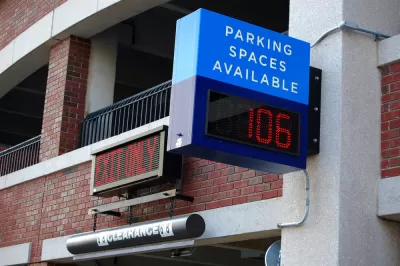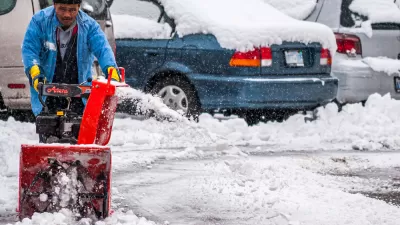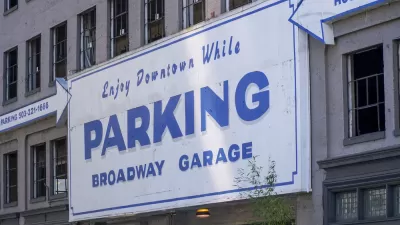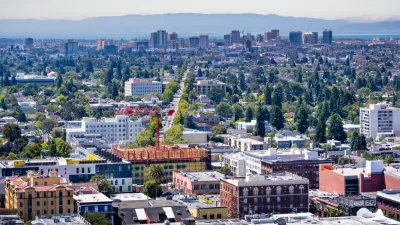The bill's author and housing advocates argue that easing parking requirements would ease the state's affordable housing crisis and promote the state's climate goals.

"It’s time to prioritize housing people over housing cars," argues the Los Angeles Times editorial board, writing in support of a new bill introduced by Assemblymember Laura Friedman (D-Glendale), which "would prohibit cities from requiring parking in developments within a half mile of a major transit stop or transit corridor." Under the proposed bill, builders can still provide parking, but blanket requirements would be eliminated.
"The state’s obsession with providing abundant parking means the cost of new construction, particularly for housing, is unnecessarily inflated." Assembly Bill 1401 "could help with two essential and sometimes overlapping goals: easing the housing crisis and reducing climate-warming emissions from vehicles."
"In some cities that are resistant to new development, stringent parking requirements are a de facto way of blocking higher-density multifamily housing and lower-income housing," encouraging the development of only high-end units that will give developers a higher return on their investment to make the project financially viable. According to one analysis, "building a parking structure added nearly $36,000 per unit." Easing parking requirements has had demonstrably positive effects on housing development. "Two decades ago, Los Angeles eased parking requirements to make it easier to convert old commercial buildings into apartments and condos. This adaptive reuse ordinance helped create nearly 7,000 units downtown by 2008."
Eliminating mandatory parking will also help the state reach its climate goals, the editorial board argues. "There’s simply no way California can meet its climate goals without slashing emissions from transportation." To reduce the need for private vehicles, "[i]t’s time to flip on its head the 'car is king' thinking that has shaped California’s development patterns for the last half-century."
In an op-ed published in Bloomberg CityLab, Assemblymember Friedman and UCLA Urban Planning professor and author of The High Cost of Free Parking Donald Shoup write that "[t]hese outdated planning policies make it difficult to build more multi-family homes within urban boundaries, fueling an unprecedented housing shortage that is entirely artificial in origin." Although they acknowledge that "parking reform isn’t a silver bullet to solve these problems, it is a vital ingredient — and one that’s already gaining traction: Many cities in California have already made the leap to break free from the high cost of 'free' parking." However, "these harmful requirements remain in place in most cities, reinforcing the need for statewide action to address California’s climate, transportation and housing challenges."
FULL STORY: Eliminate parking requirements: Housing people is more important than housing cars

Planetizen Federal Action Tracker
A weekly monitor of how Trump’s orders and actions are impacting planners and planning in America.

Maui's Vacation Rental Debate Turns Ugly
Verbal attacks, misinformation campaigns and fistfights plague a high-stakes debate to convert thousands of vacation rentals into long-term housing.

Restaurant Patios Were a Pandemic Win — Why Were They so Hard to Keep?
Social distancing requirements and changes in travel patterns prompted cities to pilot new uses for street and sidewalk space. Then it got complicated.

In California Battle of Housing vs. Environment, Housing Just Won
A new state law significantly limits the power of CEQA, an environmental review law that served as a powerful tool for blocking new development.

Boulder Eliminates Parking Minimums Citywide
Officials estimate the cost of building a single underground parking space at up to $100,000.

Orange County, Florida Adopts Largest US “Sprawl Repair” Code
The ‘Orange Code’ seeks to rectify decades of sprawl-inducing, car-oriented development.
Urban Design for Planners 1: Software Tools
This six-course series explores essential urban design concepts using open source software and equips planners with the tools they need to participate fully in the urban design process.
Planning for Universal Design
Learn the tools for implementing Universal Design in planning regulations.
Heyer Gruel & Associates PA
JM Goldson LLC
Custer County Colorado
City of Camden Redevelopment Agency
City of Astoria
Transportation Research & Education Center (TREC) at Portland State University
Jefferson Parish Government
Camden Redevelopment Agency
City of Claremont





























